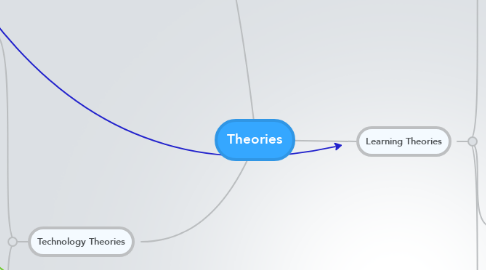
1. Technology Theories
1.1. Connectivism
1.1.1. Basic Principles
1.1.1.1. new theory focused on networking
1.1.1.2. facilitated through new technologies
1.1.1.3. importance of currency in knowledge
1.1.1.4. knowing where to find knowledge is vital
1.1.1.5. making connections between people and ideas
1.1.2. Implications for Education
1.1.2.1. theory for the 21st century learner
1.1.2.2. technological tools essential to learning
1.1.2.3. value in diversity of opinions
1.1.2.4. goal is making connections between ideas
1.2. SCOT
1.2.1. Basic Principles
1.2.1.1. humans give meaning to technology
1.2.1.2. social interaction influences technology
1.2.1.3. can only be understood as imbedded in social context
1.2.2. Implications for Education
1.2.2.1. awareness of what technology means to students
1.2.2.2. ability to alter the ways in which technology is used
1.2.2.3. influence of individual experience on the meaning of technology
1.2.3. Media Ecology
1.2.3.1. Basic Principles
1.2.3.1.1. technology influences society
1.2.3.1.2. medium is the message
1.2.3.1.3. media affects human perception
1.2.3.2. Implications for Education
1.2.3.2.1. awareness of technological affect on learning
1.2.3.2.2. use of varied forms technology for teaching
1.2.3.2.3. observe the relationship between students and media forms
2. Frameworks
2.1. Philosophy of Teachnology
2.1.1. the "tech part" of the philosophy of teaching
2.1.2. outlines a teacher's perspective of learning technology
2.1.3. can be related to learning tools for students
2.1.4. can be related to teaching tools for teachers
2.1.5. social media and professional connectivism (PLN)
2.2. TPACK
2.2.1. three types of knowledge for teachers
2.2.1.1. content
2.2.1.2. pedagogy
2.2.1.3. technology
2.2.2. search for perfect balance of these knowledge types
2.2.3. avoid using inideal technology
2.2.4. effort to find place where all three facets compliment each other
3. Learning Theories
3.1. Behaviourism
3.1.1. Basic Principles
3.1.1.1. founded in the scientific method
3.1.1.2. focused on observable behaviour
3.1.1.3. stimulus-response (repetition)
3.1.1.4. operant conditioning (reinforcement)
3.1.1.5. punishments & consequences
3.1.1.6. learning is passive
3.1.1.7. mind is a blank slate
3.1.2. Implications for Education
3.1.2.1. teacher-directed education
3.1.2.2. focus on lecture-style delivery
3.1.2.3. learning is based on extrinsic outcomes: reward & punishment
3.1.2.4. focus on observable behaviour for classroom management
3.1.2.5. focused on lowest levels of Bloom's Taxonomy
3.2. Cognitive Load
3.2.1. Basic Principles
3.2.1.1. developed in response to behaviourism
3.2.1.2. prior knowledge is key to learning
3.2.1.3. mind organizes information into meaningful schemata
3.2.1.4. focused on the limitations of working memory
3.2.2. Implications for Education
3.2.2.1. importance of prior knowledge
3.2.2.2. appropriate scaffolding required to build upon existing schemas
3.2.2.3. essential to understand the limits of working memory
3.2.2.4. extraneous load is under the control of educators
3.3. Constructivism
3.3.1. Basic Principles
3.3.1.1. learning is an active process
3.3.1.2. experience, collaboration and connections is vital to learning
3.3.1.3. the mind is a network
3.3.1.4. learning involves an individual's own interpretation of information
3.3.2. Implications for Education
3.3.2.1. teacher as a facilitator of learning
3.3.2.2. authentic tasks are important
3.3.2.3. real-world creating and exploring
3.3.2.4. involves highest levels of Bloom's Taxonomy
